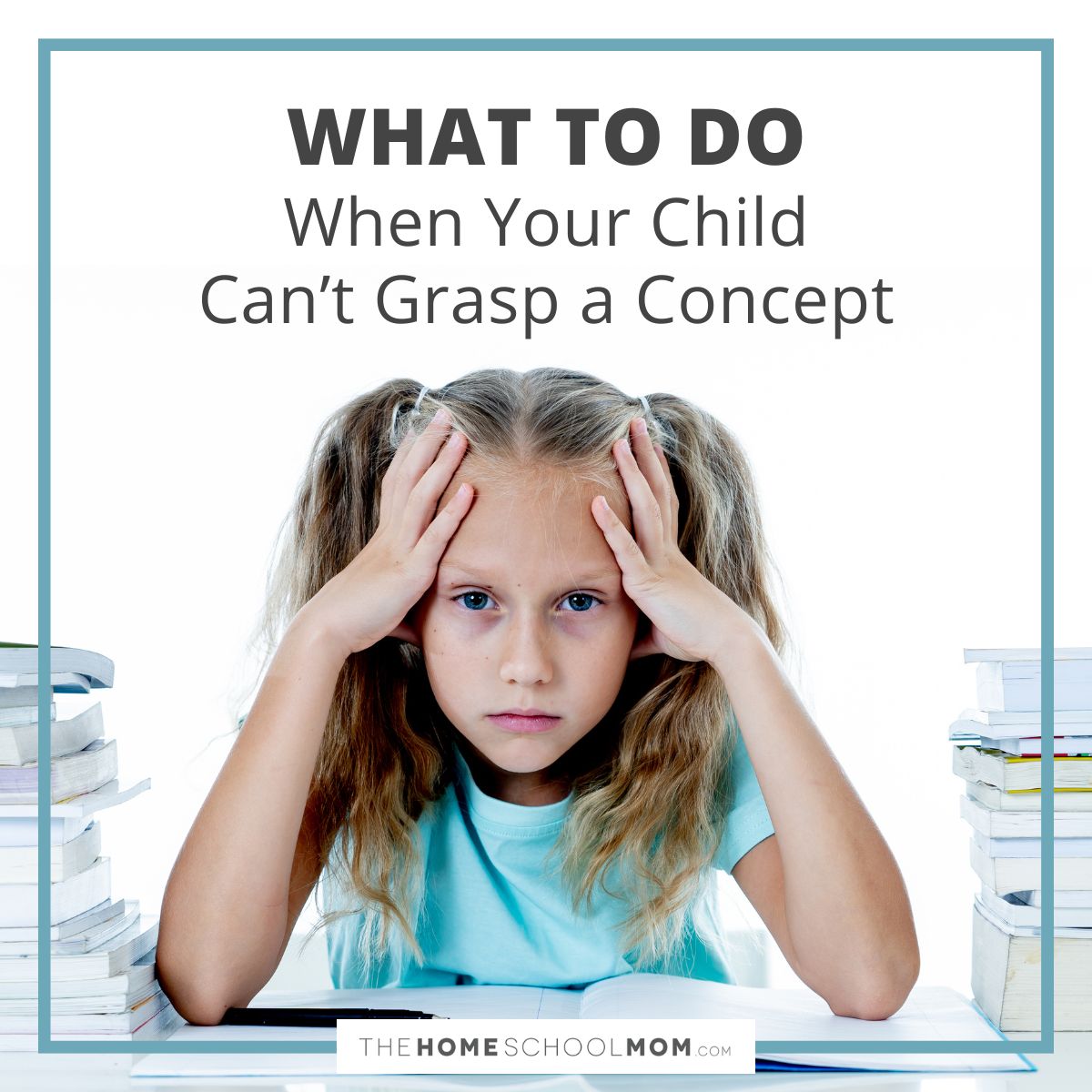It's happened with every homeschooler: you get to a concept, and no matter how much you go over it, your child just doesn't "get" it.
You've tried hands-on approaches. You've been extra interesting and dramatic in your presentation. You've attempted to teach it according to your child's learning style. You've tried to sweeten the deal with motivators.
All to no avail: your child has hit a wall.

Although this can happen at any age, it is particularly common with young children. It can be particularly frustrating to work and work on teaching a particular concept, and think that your child understands it, only to review it the next day and discover that he/she seems to know nothing about it.
While different approaches (auditory, visual, kinesthetic, etc.), curricula, or media (the use of videos or interactive computer programs) can sometimes help, the best solution is very often the simplest: stop going over that concept and come back to it later.
Young children have a remarkable ability to learn in spurts, and their cognitive development changes dramatically from month to month. A math concept, such as understanding where numbers fall on the number line, may be confusing one day, and then suddenly make sense a few weeks later.
Rather than pound a certain concept over and over again in an attempt to help the child understand (often leading to frustration on the part of the child and the parent), when the child seems to have hit a wall, simply taking a break from that particular area and returning to it at a later date can make all the difference.
I'll never forget my own frustration when I worked feverishly and with great excitement to put together a wonderful unit study on Thanksgiving for my then-four-year-old daughter.
It was multi-sensory, fun, hands-on, and creative and included elements from a variety of learning styles. We're talking interactive computer websites on the first Thanksgiving, books, a model of the Mayflower, Pilgrim craft projects (including a homemade Pilgrim hat), children's audio stories on the history of Thanksgiving playing at night, and even a Thanksgiving lapbook.
We spent at least four weeks learning about the Pilgrims and the history of the First Thanksgiving from every possible angle, with my daughter participating and engaged. I just knew she would be a Thanksgiving history prodigy after my fail-proof study.
About two days after we finished our Thanksgiving enlightenment, my daughter's aunt asked her questions about what she had learned. Much to my horror, my daughter couldn't even tell her who the Pilgrims were! Further probing revealed that she seemed to remember very little of even the most basic facts from our study.
I was devastated. I began to question my ability as a teacher, her ability as a student, our genetics, and pretty much homeschooling in general. But after some encouragement from homeschooling friends and family members, I moved forward with the understanding that she was simply young and that I was just a wee bit overzealous.
Interestingly, the following year, when we did another (albeit much simpler and more brief) Thanksgiving study, she retained every bit of the information perfectly well.
What had made the difference?
Not the curriculum (I used some of the same resources).
Not the teacher (It was still me).
Not the approach (I actually used better learning approaches the first go 'round).
Just time. She had gotten older, and by reviewing the information when her brain had matured enough to handle it, she "got it" easily and quickly.
When your young student just doesn't seem to understand or remember something you are teaching, and you've tried every avenue you can think of, take a break from that area for a while. Remember that education is a journey, not a sprint.
The facts will come over time if you are consistent, patient, and encouraging. If you positively support your child throughout the learning process and continue introducing new concepts as your child is ready and able to learn them, you will do much more than simply educate your child... you will create in him or her a love for learning.




 Rebecca Capuano holds a Master of Social Work degree from East Carolina University and is the stay-at-home mom of three children (one of whom is in heaven). She also makes attempts at being a homeschooler, writer, photographer, scrapbooker, and truth-seeker. She has worked in a variety of capacities (including group homes, day treatment centers, and public schools) with at-risk children and staff, including developing a therapeutic and educational day treatment center for delinquent youth in Wilmington, North Carolina. She currently resides in Virginia. Rebecca believes that family is created by God as the most fundamental institution in society, and she is dedicated to helping families nurture their children to become responsible persons of character and integrity.
Rebecca Capuano holds a Master of Social Work degree from East Carolina University and is the stay-at-home mom of three children (one of whom is in heaven). She also makes attempts at being a homeschooler, writer, photographer, scrapbooker, and truth-seeker. She has worked in a variety of capacities (including group homes, day treatment centers, and public schools) with at-risk children and staff, including developing a therapeutic and educational day treatment center for delinquent youth in Wilmington, North Carolina. She currently resides in Virginia. Rebecca believes that family is created by God as the most fundamental institution in society, and she is dedicated to helping families nurture their children to become responsible persons of character and integrity.
I have had the same issue with past curricula I have used - and I've had to change curricula. Particularly with global, non-sequential thinkers (for whom learning tends to come in spurts), curricula that uses a thematic approach rather than a sequential, progressive learning approach might work better for you. This way, if a certain area is not able to be mastered at this time, you can simply move on to another area and return back to it later.
I have had the worst time with my daughter regarding the topic you discussed, however, we are using a set curriculum in which can't move on until the problem areas are mastered. What do you suggest in these cases?